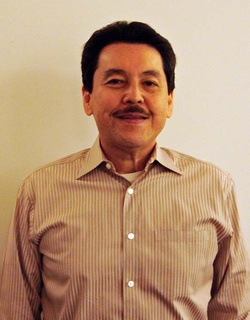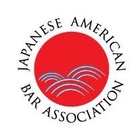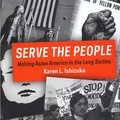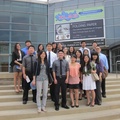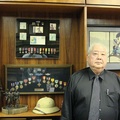Judge Jon Mayeda—a retired Los Angeles County Superior Court judge who currently works with JAMS, an Irvine-based dispute resolution and arbitration company—was always in the right places at the right times…or so he claims when he says, “It felt like the right thing to do.” But luck and serendipity can only go so far before passion and vision come into play.
As a pioneering jurist in the Japanese American community, Mayeda was instrumental in the founding of several organizations, including what is now the Asian Pacific Islander Law Students Association (APILSA) at the University of California, Los Angeles (UCLA) as well as the Japanese American Bar Association (JABA) and the Asian Pacific American Bar Association (APABA).
Southern California, Born and Raised
A southern California native, Mayeda was born in Pasadena after World War II ended. He attended Santa Barbara Avenue Elementary School (now Martin Luther King, Jr. Elementary School), Foshay Junior High School, and Dorsey High School, after which he went on to earn an undergraduate degree in psychology from the University of Redlands in 1968.
Speaking to his experience at the University of Redlands, Mayeda remembered his undergraduate hiatus from city life in Los Angeles.
“I went to college—which is probably the only time I was even away from LA, now that I think about it—at University of Redlands. It’s not that far away, but in reality, it’s like living in another state. When I went there, they did not have a tri-light signal in the whole city,” Mayeda said. “I went from spending my whole life in the city to living across the street from an orange grove in a place that had no signals and nowhere to go after dark.”
Indeed, the time he spent at the University of Redlands was the only period that he lived outside of Los Angeles.
Keeping His Options Open
A psychology major at the University of Redlands, Mayeda had initially intended to pursue a graduate degree in psychology—that is, until he started thinking about alternatives, and started thinking about how he might be able to keep his options open. In talking to older friends and mentors, Mayeda began to consider law school simply because people seemed to agree that it would allow him to keep his options open.
“I didn’t really know anything else that I wanted to do. I just knew I wanted to keep going to school. In the back of my head, I kept hearing adults who I respected—family friends—I don’t exactly know how this would come up, because I never asked anybody, ‘Do you think I should go to law school?’” Mayeda said. “I do remember family friends saying things like, ‘You should consider law school because it will help you no matter what you plan to do.’”
One of Mayeda’s psychology professors reiterated what Mayeda kept hearing about law school—it would keep his options open—and that finally convinced him to apply to law school.
“Nobody—it’s interesting—nobody said to me, you’ll like being a lawyer or what a great profession it is—nothing like that,” Mayeda said. “It was always, like, you should do that because it just keeps your options open. And I kind of liked that because the whole idea of thinking about what else to do besides go to graduate school in psychology was, I should have an option. And all I was told was, you have options if you do this.”
Having known of only one lawyer—a family friend who rarely discussed law with him—before law school, Mayeda never talked to any jurist about law or any aspects of being a lawyer.
“I had an incredibly naïve and uninformed view of law school,” Mayeda said. “I thought law school taught you things like how to be fair, how to make a decision, how to decide things. Well, it sort of does, but that’s not really what it’s teaching you. I think it’s more like critical thinking, and, kind of like, no matter what side you’re on, what’s the best argument you can make. That concept was completely foreign to me. I had no idea that’s what law school was in part trying to do. When I realized that, there was like a revelation to me. It was like, oh, if I had known that, I don’t know if I would have come to law school.”
In looking back on how he stumbled into law school, Mayeda noted how unusual his mistaken preconceptions of law school would be in the context of law students today.
“There’s nobody going to law school now that doesn’t have a better idea than I just gave you about what law school’s about. When I think about it, it sounds ludicrous, but it’s true. It’s just true. That’s the way it was,” he said.
UCLA Law School: Asian Law Students Association
It was at UCLA that Mayeda and several other students of Asian descent formed the Asian Law Students Association (ALSA), which has since become the Asian Pacific Islander Law Students Association (APILSA).
“It just didn’t feel right,” Mayeda said, speaking to the marginalization of Asian American students on campus. “You know, it’s like, we’re sort of invisible…, we don’t fit in these groups, we don’t have a group, so we should do something about it.”
Since it boasted an initial membership of less than ten Asian American students in 1969, the Asian Law Students Association has flourished and become one of the largest law students organizations on UCLA’s campus.
Its original mission centered on increasing representation in the legal profession, according to Mayeda.
“The goal was really to increase the number of Asians in law school,” Mayeda said. “We just recognized, we were kind of invisible or not really accounted for as a group. And we were just sort of having that feeling, like we should. Those other minorities have done this, why shouldn’t we? And so, as the next couple of years went on, we did.”
Mayeda also lauded the later law students who carried the organization forward and helped it grow.
“The students after us kept pushing it, too. [The Asian Law Students Association] got bigger, they did more, got more active,” Mayeda said. “Other people after us did much more, in my opinion.”
The Los Angeles City Attorney’s Office
After he graduated from law school in 1971, Mayeda eventually got a job in the city attorney’s office. As a young city attorney, though, he quickly grew fond not of being in trial, but rather arbitrating deals on cases.
“I liked the courtroom, and I liked all the activity there,” Mayeda said. “Most lawyers, if they like it all, they love courtrooms where they’re doing trials. And I realized, after a couple years, trials are kind of slow. It’s a slow way to an answer. In the same time that you can do one trial, if you’re in a different courtroom, where you’re making deals on cases, you’d do dozens over a couple days’ period. I liked that.”
Looking back on his uninformed view of law school as a place where one learned how to arbitrate and make decisions, though, Mayeda saw that the courtroom offered that training ground of experience.
“I liked that action about thinking about different things, so in the back of my mind, I realized that what I mistakenly thought I was going to learn in law school is really kind of like how do you be judge,” Mayeda said.
Eventually, his courtroom experience as a city attorney would pave the way to his judgeship.
The Japanese American Bar Association
Mayeda, who served as the third president of the Japanese American Bar Association (JABA) in 1979, also played a role in its formation.
In explaining the founding of JABA, Mayeda brought up a question that he says were on some of the minds of the founding members: why start a Japanese American bar association as opposed to an Asian American bar association? After all, Mayeda himself had started not a Japanese American law students organization, but a pan-Asian law students organization, in his time at UCLA. For Mayeda, though, the existence of the Southern California Chinese Lawyers Association helped contribute to the answer.
“We can’t start an Asian bar because we’d sort of subsume them when they already exist,” Mayeda said, speaking to the sociohistorical moment of the late 1970s. “So that, and the fact that those of us in the room were all Japanese Americans—that’s what the need [was] at the moment.”
In his discussion of how few Japanese American lawyers there were at JABA’s inception, Mayeda told the story of two undercover detectives who crashed a JABA-hosted cocktail reception to gather intelligence about what they thought was an association of bar owners—not Japanese American attorneys.
“[That incident] shows how unsophisticated the police department was then, and it [also] shows how far Asian lawyers have come [since],” Mayeda said.
Becoming a Judge
When he was elevated by Governor Jerry Brown to the Los Angeles County Municipal Court bench in 1981, Mayeda recalls a mixture of thoughts and emotions.
“I knew exactly where—not exactly—but I knew the kinds of courts I was going to be in and the kind of work I was going to be doing. So that part was—that wasn’t a mystery to me,” he said. “I think the thing I thought about was more about my parents’ generation and my grandparents’ generation, and how far everything had progressed in those two generations.”
As a Japanese American—and Asian American—judge, Mayeda also gave some thought to the implications of what it meant to be a judge in a society where Japanese American—and for that matter, Asian American—judges were almost unheard of.
“You don’t want to mess up,” Mayeda said, remembering the pressure of being a newly-appointed Japanese American judge. “It’s like, gee, you know, I knew—you know you got there in part, if not in large part, because you’re Asian, so—or Japanese—so if you mess up, well, you’re going to be known as that Asian or Japanese judge that messed up.”
Eighteen years later, in 1999, though, Mayeda was elevated by Governor Gray Davis to the Los Angeles County Superior Court bench. At the time, Burt Pines—Mayeda’s former boss in the city attorney’s office—was the judicial appointments secretary, and Michael Yamaki—who had been friends with Mayeda since high school—was the governor’s appointments secretary.
As a result of his ties to the Davis administration, Mayeda’s elevation to the Superior Court bench was simply a formality, according to Mayeda.
“The funny thing is, when I actually got elevated, nothing changed. Zero. Nothing. I literally just stayed in the same courtroom with the same calendar and the same work, and the biggest favor I could get out of the new—my new presiding judge was just to leave me alone,” he said.
From JAMS, Looking Back
Mayeda served on the Superior Court bench for eight years before retiring in 2007 at the age of 59, after which he went to work for JAMS, a dispute resolution services provider.
“One of the things I really liked doing was this whole, let’s see if we can resolve this without a trial, thing,” Mayeda said, explaining that he wanted to work less but he still wanted to be working in arbitration and dispute resolution. JAMS, and places like it, provided the opportunity for him to continue doing something he loved with the added appeal of working less.
Speaking to his current work with JAMS, Mayeda mentioned that he appreciates the fact that he can do what he loves—arbitrating disputes—without doing the things that he dislikes, like writing. In retrospect, the choice that he had to continue as a judge or go to work for JAMS, was a luxury, according to Mayeda.
“All I can keep saying is, I’m very, very lucky. I have a choice. Or at least, I had a choice. I had a choice until I retired,” Mayeda said.
© 2012 Lawrence Lan


